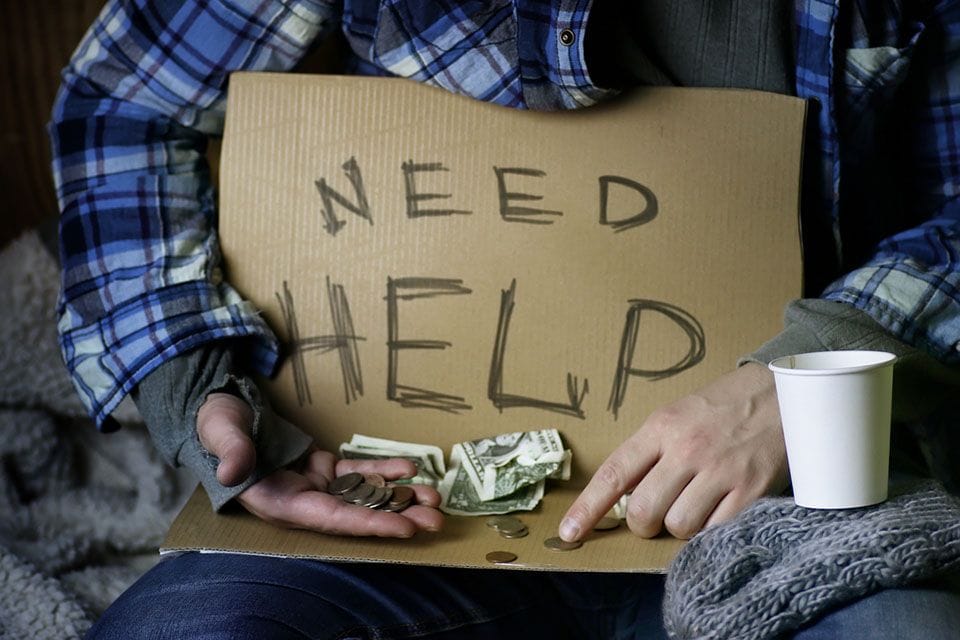The link between substance abuse, mental health troubles and homelessness is well-known and established. But much less talked about or understood is the strong connection between problem gambling and homelessness. In 2014, there were two fact-finding projects aimed at probing the relationship between pathological gambling and homelessness, and the information each uncovered was eye-opening. In the first, a team of representatives from King’s College London and several private organizations collaborated on a series of interviews with 450 homeless people residing in various shelters in the London borough of Westminster. According to data compiled by the British Gambling Prevalence Society, just 0.7 percent of U.K. residents suffer from a pathological gambling condition. However, the tools for clinical diagnosis used in the Westminster study revealed that 11.6 percent of the homeless people interviewed registered positive for problem gambling. This means that a homeless Londoner is about 16 times more likely to suffer from this type of behavioral problem than the typical citizen. The second 2014 study to shed light on the homelessness-gambling relationship was carried out in Canada, under the auspices of St. Michael’s Hospital in Toronto. A total of 254 homeless clients served by the Good Shepherd Ministries were asked about their lives and personal histories in order to see which factors had helped lead them to their unfortunate state. An astonishing 35 percent reported past problems with compulsive gambling, which represents about a 12-fold jump over what would be expected in a nation where the gambling addiction rate is estimated to run in the 2 percent to 3 percent range. Even though these two studies took place outside the United States, they dovetail with data collected on these shores. The Atlantic City Rescue Mission, in coordination with the Association of Gospel Ministries in Kansas, surveyed a large number of homeless people in 2003 and found that 20 percent had struggled with problem gambling at some point. Interestingly, the comprehensive 1999 National Gambling Impact Study Commission (NGISC) found the same percentage of problem gamblers among Las Vegas’ homeless population. Of course the objection could be raised that because Atlantic City and Las Vegas are gambling meccas, a greater incidence of gambling addiction might be expected among any sampling of citizens. But the NGISC report reveals that 18 percent of Rescue Mission inhabitants nationwide identified problem gambling as a primary cause of their plight. So overall the statistics on homelessness and gambling in the United States are pretty consistent regardless of geographical considerations. With 2 percent to 3 percent of the population diagnosable for problem gambling, homeless Americans are about nine to 10 times more likely than the general population to suffer such an affliction. But because the data on this question is a bit dated, it is certainly possible that gambling is more of an issue for homeless people now than it was 10 to 15 years ago.
Problem Gambling and Homelessness: Exploring the Complexities
In summarizing their findings for publication in the Journal of Gambling Studies, the sponsors of the British and Canadian studies both made the same recommendation, namely that those responsible for running homeless shelters and rescue missions include questions about gambling as a part of their screening procedures. This is already done for substance abuse and mental illness in order to ensure that the proper services are made available for those who qualify. It is clear based on the data collected that diagnosis of and treatment for gambling addiction could make a significant impact on the lives of many homeless individuals, helping them get back on their feet while guiding them toward a more stable and sustainable life path. One aspect of the situation not addressed in the two studies was chronological order. That is, did the gambling addiction come before homelessness in every instance, or did homelessness come first in some cases? Common sense would suggest the latter is more common, but it is possible that in some instances financial hard times may have led to an increase in reckless behavior. Another issue that needs to be explored is the possible relationship between substance abuse, poor mental health and problem gambling. It seems reasonable to speculate that a high percentage of homeless people with gambling problems might also suffer from co-occurring chemical addictions or mental illness, but much more research will need to be done in order to arrive at a conclusive answer.



